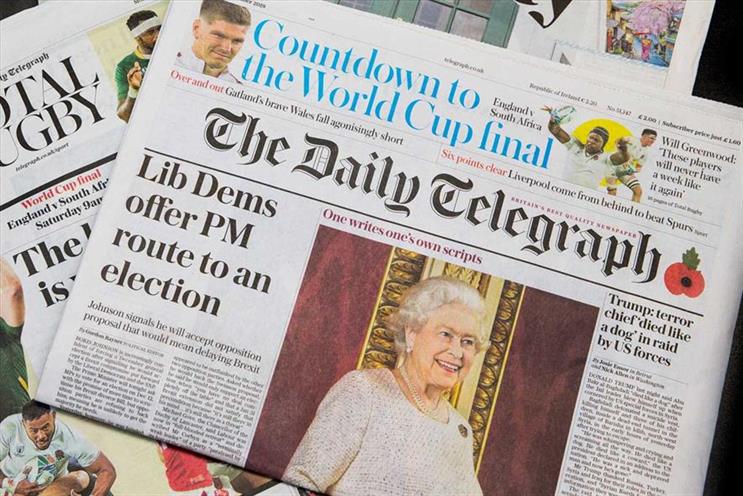
Telegraph Media Group is to "significantly downsize" its branded content arm Spark and cut "non-editorial" jobs.
It is understood that nearly 100 roles could be at risk during an employee consultation, which will likely last until August, at the publisher of the Daily Telegraph.
Nick Hugh, chief executive of TMG, told staff in a memo that the company had been planning to downsize Spark in 2021 but has brought forward its plans because of the coronavirus slump.
Hugh wants to drive subscription revenue from its paid user base, which passed 500,000 subscribers in May, and he said TMG willl "no longer have branded content on any of our channels" as part of that strategy.
Instead, the news publisher will offer what it called "editorially integrated partnerships tied to our reader-first approach".
In practice, it is thought that TMG will continue to work with advertisers on partnerships where a brand follows the editorial agenda – for example, the Telegraph Women's Sport section launched last year and has attracted a number of brands that have produced content alongside the editorial.
TMG has contacted agencies to explain the shift away from standalone branded content.
"We will replace brand-led content with editorially integrated partnerships tied to our reader-first approach," the company said in a message.
"These will enable brands to become more closely connected to our journalism, thus enabling deeper relationships with our readers.
"We will continue to focus on longer-term partnerships with brands and we hope this will include many existing Spark clients."
TMG added: "These changes mean that we are proposing to significantly downsize our Spark team as soon as possible, and some areas that work closely to support this area.
"This is the right long-term decision for the Telegraph and our readers, actively supporting and enhancing our subscriptions-first strategy and vision for the future.
"Experience tells us that making the best decision for our readers delivers the best results for our brand partners too."
Impact of Covid-19
Hugh said: "Whilst we had always anticipated making this change in 2021, we have accelerated our plans given the impact that Covid-19 has had on the advertising market, particularly in the area of branded content.
"Instead, our focus will be on long-term partnerships with brands who closely complement our quality journalism and the experience of our readers, and actively contribute towards our subscriptions-first strategy and goals."
Spark will stop making branded content by the end of 2020, but will continue to carry out work until then.
Hugh said the publisher’s "subscriptions-first" approach was working as it aims for 10 million registered users and a million paying subscribers by 2023 – a strategy dubbed "10-1-23" – and pointed to the recent decision to repay furlough money to the government as proof.
Several competitors expressed surprise at TMG's decision.
"Branded content is effective. It gets you meetings with clients, but it is not just window-dressing. Margins can be lower [than display advertising, because the publisher must pay for designers and writers], but if you get the margins right, it is a good line of business," one sales figure said, adding that advertising and subscription "are not mutually exclusive".
Spark was set up in 2015 as a growing number of brands looked beyond traditional advertising and asked for broader creative and content offerings that were bolstered by data and audience insight.
The branded content arm went on to expand in areas such as video, interactive games and maps, and Spark is shortlisted for Content Studio of the Year at the .
According to TMG’s most recent annual report for 2018, the company employed 1,149 staff – with 538 in selling, distribution and administration, and 611 in editorial and production.
Many other media companies are making cuts because of the impact of Covid-19.




.jpg)
.jpeg)
